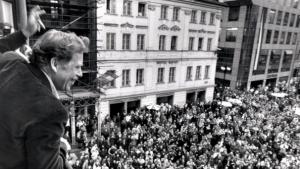Over 30 years of anarchist writing from Ireland listed under hundreds of topics
Vaclav Havel's role in history
 Two leaders died over this weekend. Kim-il Jong, the isolated “dear leader” Stalinist North Korea, and Vaclav Havel a playwright, and former dissident, an ex prisoner who become the leader of his country out of the dark times of totalitarianism and into the light of the free markets. The story in the west will be spun in this way as people understand simple stories of good guys and bad guys.
Two leaders died over this weekend. Kim-il Jong, the isolated “dear leader” Stalinist North Korea, and Vaclav Havel a playwright, and former dissident, an ex prisoner who become the leader of his country out of the dark times of totalitarianism and into the light of the free markets. The story in the west will be spun in this way as people understand simple stories of good guys and bad guys.
We know history is not the story of individual men and political leadership but the press do not waste time with such complex ideas. Take this quote from the Guardian editorial (19th Dec. 2011) “We live in a time in which an increasingly introverted and fearful Europe is becoming synonymous with failure and impossibility, in which political leadership is treated with contempt and exasperation, and in which politics is all too often dismissed as corrupt, craven and irrelevant. Havel's personality and career though, were the antithesis of all of these gloomy current prejudices.” So we can see where this is going. The canonization of one man but we contest that the story of the transition is more complicated than that.
A WSM member who is a Czech migrant to Ireland reports that “I’m in the Czech rep. surrounded by Havel hysteria. The man who became a symbol of change from Stalinist regime to real capitalism. He was always taken as a moral authority. I would like to disprove this by pointing few facts about form the past. Vaclav Havel was born in to notoriously known wealthy family. After the changes in 1948 new establishment nationalized most of the Havel’s family assets. I would see here the first reason for Havels activism in greed. Many other dissidents were complaining about Havel because he was abusing the aid for political prisoners sent from western organisations . After the Velvet Revolution Havel was agreed as the presidental candidate in between former leaders of the state and a group of a few elite dissidents .
These meetings resulted in to some sort of transition deal. Simply described it was that Havel will be president, the leading role given to the Communist Party in the constitution will be abolished in exchange for integrity for Communist party of Czechoslovakia and some of its members who were actively involved in invitation of Warsaw pact into Czechoslovakia back in 1968. During these presidential years Havel was an active supporter of Bush family, he paid them a few personal visits during the Clinton era. After the NATO intervention in Serbia Havel became known for his description of this criminal act as “Humanitarian bombing”. To me this man is worth nothing compare to the student & worker activists who got battered on 17th of November 1989 and again on many occasions after the transition under his presidency. On the day of 17th November he was relaxing at his cottage away from the main event of the Velvet Revolution and he was chosen as a symbol of the transition weeks after this day.”
November 17th was the day of the violent suppression of by riot police of a student demonstration in Prague which resulted in several days of mass protest, with an estimated 800,000 participants in Prague alone. On the evening of the third day of the demonstrations Havel with other members of Charter 77 announced the formation of Civic Forum as a mass popular movement for reform. Members of Civic Forum began unofficial negotiations with Prime Minister Ladislav Adamec the following day. After some days and a two day general strike a transition was negotiated, as part of which Havel was elected President on December 29th.
Havel’s activist role had in fact been in the 1960’s and ‘70’s starting with his Radio Free Czecho-Slokakia commentary during the soviet invasion of Czech-Slovakia in the Spring of 1968 and following on with his involvement in Charter 77. That activism resulted in seven prison sentences, the longest of which saw him spend over 4 years in prison. That role made his election a powerful symbol that the transition to ‘democracy’ was real, and an assurance for the the other half of that deal - the protection of figures from the old regime.
In the aftermath of the S26 World Bank protests in 2000 the Economist described how he “roundly condemns the violence and fanaticism of the protesters, thousands of whom had gathered in Prague to inveigh against the perceived evils of capitalism and globalisation personified by the bigwigs attending this year’s annual meeting of the IMF and World Bank.” That article opens with a description of the events as “angry protesters besieging a flint-faced regime in the heart of Prague, the Czech capital; ninja-clad riot police defending hated oppressors with water-cannons and tear-gas against underdogs clamouring for justice.” In fact almost 1,000 protesters were arrested on September 26th, many during a massive police baton and tear gas revenge attack in Wenceslas Square after the summit had been shut down. The summit had actually taken place in the conference hall built before the transition for the old Communist Party to stage its conferences, a case of ‘say hello to the new boss.’

